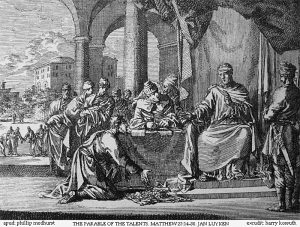Thoughts on Sunday’s Lessons for Nov. 15, 2020
First Reading (Track One): Judges 4:1-7
We have two more weeks before Advent begins on December 6, but in times past Advent was a 40-day season with a more penitential tone, akin to Lent.

The Parable of the Talents (1791-1795), etching by Jan Luyken illustrating Matthew 25:14-30 in the Bowyer Bible, Bolton Museum, Lancashire, England. (Click image to enlarge.)
Advent is shorter now, with a more hopeful tone of anticipation, but our readings still echo the longer season, pointing our imagination toward God’s final judgement and the last days. Sunday’s Track One first reading concludes our long journey through the ancestral stories of Israel in the book of Judges. The people live in the promised land but don’t yet have a king. They have settled in to an alternating cycle of behaving badly – “doing what was evil in the sight of the Lord” – then repenting, turning back, and restoring justice under a leader called a judge. In light of the Bible’s patriarchal culture it may surprise us that one of the most noteworthy judges was Deborah, a woman and a prophet, who with God’s help is not slow to order her male generals into battle.
First Reading (Track Two): Judges 4:1-7
In Sunday’s Track Two first reading, we hear the minor prophet Zephaniah foretell the destruction and exile of the Northern Kingdom, Israel, for its peoples’ and their leaders’ failure of righteousness: They pursued wealth and fell away from following God’s ways. His apocalyptic vision of the Great Day of the Lord seems to foreshadow the vision of Revelation: He imagines a horrifying Judgement Day, when their gold and riches won’t save them from reaping what they sowed: A fire of passion that will consume all the earth and all the people in it.
Psalm (Track One): Psalm 123
Harmonizing with the leadership of the female judge Deborah in the Track One first reading, this brief but powerful Psalm offers worship and praise to a God clearly seen as both male and female, both master and mistress. In its brief five verses, one of the shortest of all the Psalms, we can see inspiration for a theology of liberation, too: The Psalmist implicitly calls for a preferential option for the poor, in contrast with the contempt shown them by the rich and the proud.
Psalm (Track Two): Psalm 90:1-12
We are very small. God is very large. And our time is nothing like God’s time: A thousand of our years pass in a moment for God, while our lives “pass away quickly and we are gone,” like grass that dries up in a day in the desert heat. The Psalmist – taken by tradition to be Moses – petitions God on our behalf, praying that God may help us learn to make good use of the time that we are allotted.
Second Reading: 1 Thessalonians 5:1-11
In last week’s second reading, Paul assured his church in Thessalonika that the Christians who had died before Christ’s return would not lose their opportunity to be with him in God’s kingdom. Now, in the last chapter, he urges them to be prepared. Using colorful metaphors – a thief in the night, and a woman’s sudden labor pains – he emphasizes that the day of the Lord may come suddenly and by surprise. Be faithful, he says; be loving; care for one another, and be ready.
Gospel: Matthew 25:14-30
Many of us would probably be just as cautious in safeguarding an angry master’s treasure as was the third slave who buried and made no profit on the valuable silver talent left in his charge. But look at the context of this parable in Matthew’s Gospel, only a day or two before Jesus is to be crucified: Jesus is focused on the last days. Just after this passage is the Gospel we will hear next week: Jesus’ account of the last judgement, when Christ as judging King will sort out those who saw the face of Jesus in the hungry, the thirsty, the oppressed, sick persons and prisoners from those who did not. Like the first two slaves, we are called to take risks, see Jesus present in the poor and the oppressed, and give of ourselves abundantly.

Please send weekly illuminations
Thanks
Sure! We’ll add you to the email list. Each week’s new Illuminations usually go out around 9 a.m. Tuesday mornings. Thanks for signing on!